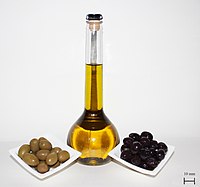
Photo from wikipedia
Aqueous and ethanolic extracts of tomato pomace were examined with the aim of optimizing the extraction process of compounds with cardioprotective activity. Once the results of the ORAC response variables,… Click to show full abstract
Aqueous and ethanolic extracts of tomato pomace were examined with the aim of optimizing the extraction process of compounds with cardioprotective activity. Once the results of the ORAC response variables, total polyphenols, °Brix, and antiplatelet activity of the extracts were obtained, a multivariate statistical analysis was performed using the Statgraphics Centurion XIX software. This analysis showed that the most relevant positive effects in the inhibition of platelet aggregation were 83 ± 2% when using the agonist TRAP-6, when the working conditions were the type of tomato pomace conditioning (drum-drying process at 115 °C), phase ratio (1/8), type of solvent (ethanol 20%), and type of extraction (ultrasound-assisted solid–liquid extraction). The extracts with the best results were microencapsulated and characterized by HPLC. The presence of chlorogenic acid (0.729 mg/mg of dry sample) was found, a compound that has a potential cardioprotective effect documented in various studies, in addition to rutin (2.747 mg/mg of dry sample) and quercetin (0.255 mg/mg of dry sample). These results show that the extraction efficiency of compounds with cardioprotective activity depends largely on the polarity of the solvent, thus playing an important role in the antioxidant capacity of the extracts of tomato pomace.
Journal Title: Plants
Year Published: 2023
Link to full text (if available)
Share on Social Media: Sign Up to like & get
recommendations!